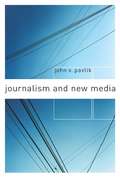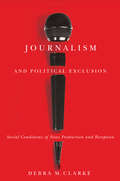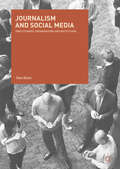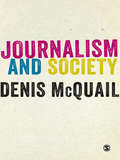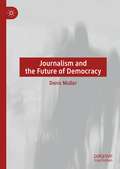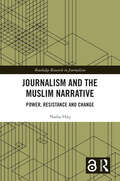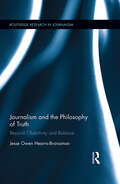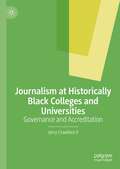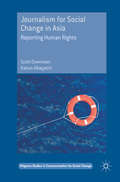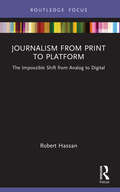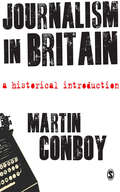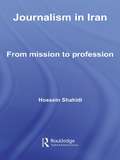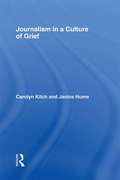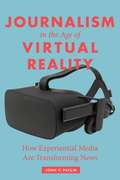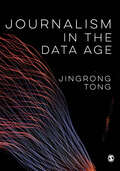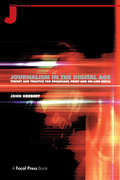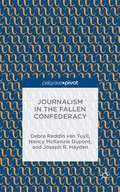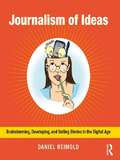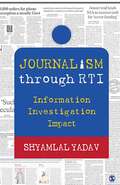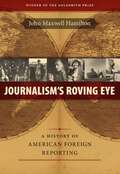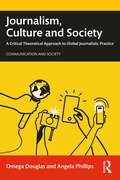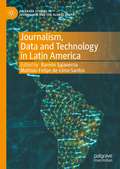- Table View
- List View
Journalism and New Media
by John PavlikUbiquitous news, global information access, instantaneous reporting, interactivity, multimedia content, extreme customization: Journalism is undergoing the most fundamental transformation since the rise of the penny press in the nineteenth century. Here is a report from the front lines on the impact and implications for journalists and the public alike. John Pavlik, executive director of the Center for New Media at Columbia University's Graduate School of Journalism, argues that the new media can revitalize news gathering and reengage an increasingly distrustful and alienated citizenry. The book is a valuable reference on everything from organizing a new age newsroom to job hunting in the new media.
Journalism and Political Exclusion
by Debra ClarkeThe constraints of news production and the consequent limitations of news result directly in dissatisfaction throughout news audiences. News stories are frequently found to be inadequately informative to the extent that journalism is more inclined to generate political disenchantment, rather than prompt its audiences to pursue a fully engaged level of political participation in their societies. Journalism and Political Exclusion provides a multi-method, integrated analysis of news production and news audiences, including a long-term study of community activists in a central Canadian city. During the seven-year fieldwork period, different groups of research participants completed questionnaires, wrote news diaries, and were interviewed in their homes while viewing network television newscasts. Clarke shows that frustrations with the informational limitations of television and other news media are accelerated among women and the working-class often lack opportunities to access alternative information sources. The critical contribution of journalism to the production and reproduction of ideas about social reality is frequently acknowledged and assumed yet rarely investigated and demonstrated. Through an examination of the everyday realities of both news production and news reception, Journalism and Political Exclusion also shows how the current "crises" of professional journalism heighten the level of political exclusion experienced by various social groups.
Journalism and Political Exclusion: Social Conditions of News Production and Reception
by Debra M. ClarkeThe constraints of news production and the consequent limitations of news result directly in dissatisfaction throughout news audiences. News stories are frequently found to be inadequately informative to the extent that journalism is more inclined to generate political disenchantment, rather than prompt its audiences to pursue a fully engaged level of political participation in their societies. Journalism and Political Exclusion provides a multi-method, integrated analysis of news production and news audiences, including a long-term study of community activists in a central Canadian city. During the seven-year fieldwork period, different groups of research participants completed questionnaires, wrote news diaries, and were interviewed in their homes while viewing network television newscasts. Clarke shows that frustrations with the informational limitations of television and other news media are accelerated among women and the working-class often lack opportunities to access alternative information sources. The critical contribution of journalism to the production and reproduction of ideas about social reality is frequently acknowledged and assumed yet rarely investigated and demonstrated. Through an examination of the everyday realities of both news production and news reception, Journalism and Political Exclusion also shows how the current "crises" of professional journalism heighten the level of political exclusion experienced by various social groups.
Journalism and Social Media
by Diana BossioThis book offers a comprehensive investigation of the ways in which social media has affected change to the constitution of mainstream journalism. The volume does this in a unique way - by tracing the links between the different changes social media has brought to individual journalism practice, organisational processes and policies and institutional understandings of journalism. The role of social media platforms in the changing professional landscape of journalism is explored, both in terms of the changes that social media platforms have impacted on journalism, but also the way in which journalistic use of social media has impacted on particular uses of these platforms. Therefore, Journalism and Social Media is not simply a description of changed journalistic practices, but endeavours to encapsulate a complex and integrated techno-social relationship, incorporating both the individual practices of journalists, as well as the larger organisational and institutional changes that have occurred due to the increasing use of social media to investigate, present and disseminate news.
Journalism and Society
by Denis Mcquail"Every serious student of journalism should read this book... Denis McQuail has succeeded in producing a work of scholarship that shows what journalists do and what they should do." - Stephen Coleman, University of Leeds "For a half century we have spoken earnestly of journalism's responsibility to society instead of to business and government. Now this concept is given sophistication unmatched, by the best scholar of media theory of his generation." - Clifford Christians, University of Illinois "Denis McQuail reminds us of the continuing social and political relevance of journalism in and for democratic societies. The grand old man of communication theory presents an overarching social theory of journalism that goes beyond the usual Anglo-American focus." - Jo Bardoel, University of Amsterdam (ASCoR) and Nijmegen "In Journalism and Society Denis McQuail is at his best... A firm guide in the understanding of the principles of a profession that is a core activity of modern societies. A must-read book for students, academics and journalists." - Gianpietro Mazzoleni, University of Milan This book deals with the eternal question of how journalism is linked to society... I cannot think of a better staple food for students of journalism at all levels." - Kaarle Nordenstreng, University of Tampere This is a major new statement on the role of journalism in democracy from one of media and communication's leading thinkers. Denis McQuail leads the reader through a systematic exploration of how and why journalism and society have become so inextricably entwined and - as importantly - what this relationship should be like. It is a strong re-statement of the fundamental values that journalism aspires to. Written for students, this book: Makes the theory accessible and relevant Teaches the importance of journalism to power and politics Explores the status and future of journalism as a profession Outlines the impact and consequences of the digital Reveals journalism as it is, but also as it should be Takes each chapter further with guided reading list and free online journal articles. This textbook is the perfect answer to the how and why of journalism. It is crucial reading for any student of media studies, communication studies and journalism.
Journalism and the Future of Democracy
by Denis MullerThis book is about how journalism can contribute to the recovery of democracy from the crisis exemplified by the Trump presidency, the Brexit referendum and the rise of populism across the Western world. It explores the ethical concepts that provide the foundation for journalism in modern democracies: pluralism, liberalism, tolerance, truth, free speech, and impartiality. History has shown that crisis brings opportunity for change on a scale that is unachievable under ordinary political conditions, and this book proposes fundamental ways in which journalism can help democratic societies seize the moment. It traces the development of traditional mass media and social media and explores how the two might work better together to benefit democratic life. The development of press theory is described, and enhanced by a proposed new theory, Democratic Revival.
Journalism and the Muslim Narrative: Power, Resistance and Change (Routledge Research in Journalism)
by Nadia HaqJournalism and the Muslim Narrative presents an empirical analysis of how modern-day journalism practices contribute to the negative bias against Muslims in Britain, to provide an in-depth investigation of how we can better re-conceptualise journalism for our increasingly multicultural societies.For more than 20 years, media activists and academic scholars have highlighted a bias in British newspapers where Muslims are portrayed as the problematic ‘Other’ of British society. This book draws on the representation of Muslims to contribute a critical, empirical analysis of contemporary journalistic practices in multicultural societies. This includes a deeper insight into media audiences and the public, journalism norms and values such as objectivity, balance and freedom of speech, the wider implications of the increasing digitalisation of the media and the tensions between media structures and journalistic agency. As competition with social media heightens pressures on journalists to produce even more sensationalist and polarising coverage about Muslims, this book further offers a critical evaluation of how journalism needs to be re-imagined to realise its civic role in our progressively digitalised and diverse societies. Drawing on the first-hand accounts of newspaper journalists and editors, the author challenges our understanding of journalism and the role that journalists play in uniting, rather than dividing, our diverse societies.This book builds a critical appraisal of academic perspectives from journalism, media and cultural studies, sociology, postcolonial theory and the study of race and religion, and how journalism practices can either perpetuate or challenge discriminatory and divisive narratives about Britain’s Muslim communities. It will be of value to journalism practitioners as well as academics studying journalism, media and communications, cultural studies and race and ethnicity studies.The Open Access version of this book, available at http://www.taylorfrancis.com, has been made available under a Creative Commons Attribution-Non Commercial-No Derivatives (CC BY-NC-ND) 4.0 license.
Journalism and the Periodical Press in Nineteenth-Century Britain
by Joanne ShattockNewly commissioned essays by leading scholars offer a comprehensive and authoritative overview of the diversity, range and impact of the newspaper and periodical press in nineteenth-century Britain. Essays range from studies of periodical formats in the nineteenth century - reviews, magazines and newspapers - to accounts of individual journalists, many of them eminent writers of the day. The uneasy relationship between the new 'profession' of journalism and the evolving profession of authorship is investigated, as is the impact of technological innovations, such as the telegraph, the typewriter and new processes of illustration. Contributors go on to consider the transnational and global dimensions of the British press and its impact in the rest of the world. As digitisation of historical media opens up new avenues of research, the collection reveals the centrality of the press to our understanding of the nineteenth century.
Journalism and the Philosophy of Truth: Beyond Objectivity and Balance (Routledge Research in Journalism)
by Jesse Owen Hearns-BranamanThis book bridges a gap between discussions about truth, human understanding, and epistemology in philosophical circles, and debates about objectivity, bias, and truth in journalism. It examines four major philosophical theories in easy to understand terms while maintaining a critical insight which is fundamental to the contemporary study of journalism. The book aims to move forward the discussion of truth in the news media by dissecting commonly used concepts such as bias, objectivity, balance, fairness, in a philosophically-grounded way, drawing on in depth interviews with journalists to explore how journalists talk about truth.
Journalism at Historically Black Colleges and Universities: Governance and Accreditation
by Jerry Crawford IIHistorically Black Colleges and Universities (HBCUs) are facing challenges to their continued existence on several fronts. One is fiscally, as federal funding for education has been cut and the responsibility for paying for higher education has been levied on students and parents. Another challenge is the amount of endowment dollars available to them and lastly, there are questions today as to if HBCUs are still needed in a society that has allowed African-Americans to attend Predominantly White Institutions (PWIs). The third are the challenges placed on institutions, as a whole, and specific departments, in attaining and maintain accreditation. Finally, how are administrators handling these challenges during the pandemic and their own health and well-being? This book explores journalism accreditation at HBCUs and is informed by many years of research into how journalism units have acquired and lost accreditation. The book also examines Hispanic Serving Institutions (HSIs) and Tribal Colleges and Universities (TCUs) and how they are navigating accreditation and financial challenges. The book will be of interest to faculty, students, scholars and administrators of journalism studies.
Journalism for Social Change in Asia: Reporting Human Rights (Palgrave Studies in Communication for Social Change)
by Scott Downman Kasun UbayasiriThis book explores the role and purpose of journalism to spark and propagate change by investigating human rights journalism and its capacity to inform, educate and activate change. Downman and Ubayasiri maximize this approach by proposing a new paradigm of reporting through the use of human-focussed news values. This approach is a radical departure from the traditional style that typically builds on abstract concepts. The book will explore human rights journalism through the lens of complex issues such as human trafficking and people smuggling in the Asian context. This is not just a book for journalists, or journalism academics, but a book for activists, human rights advocates or anyone who believes in the power of journalism to change the world.
Journalism from Print to Platform: The Impossible Shift from Analog to Digital (ISSN)
by Robert HassanThrough a synthesis of philosophical anthropology and media theory, this book examines the human relationship with technology, progressing from analogue to digital, to give a new perspective on journalism in the digital age.Journalism from Print to Platform takes a fresh look at the relationship between journalism as a craft shaped by its tools and considers anew the tools themselves. This book demonstrates that, with the emergence of digitality, what analogue print culture made possible and seemingly “natural” has now become unworkable. Digital logic constitutes a wholly different category of technology with a framework that makes fidelity in one-to-one exchange of analogue-to-digital in communication problematic. In short, the technology-based forms and practices that journalism developed as a fourth estate/public sphere enabler are, like us, irreducibly analog. Whilst we have mostly assumed that these would either adapt to or carry over with the shift to digitality, this book challenges that assumption and considers the important consequences of that realisation for the practice of journalism today.This challenging study is an insightful resource for students and scholars in journalism, media and technology studies.
Journalism in Britain: A Historical Introduction
by Dr Martin Conboy"What might have been a forbidding chronological slog is thoroughly enlivened by Conboy's thematic approach, shot through with passion and rigour in equal measure. This is a book written with a commitment to the importance of history for the present; it will undeniably cultivate the same commitment in its readers." - Chris Atton, Edinburgh Napier University "An authoritative and accessible introduction to the history of journalism. Excellent resource for undergraduates." - Philip Dixon, Southampton Solent University A firm grasp of journalism's development and contribution to social and political debates is a cornerstone of any media studies education. This book teaches students that essential historical literacy, providing a full overview of how changes in the ownership, emphasis and technologies of journalism in Britain have been motivated by social, economic and cultural shifts among readerships and markets. Covering journalism's enduring questions - political coverage, the influence of advertising, the sensationalization of news coverage, the popular market and the economic motives of the owners of newspapers - this book is a comprehensive, articulate and rich account of how the mediascape of modern Britain has been shaped.
Journalism in Iran: From Mission to Profession (Iranian Studies)
by Hossein ShahidiFocusing on newspapers, radio and television, this book provides the first systematic investigation of the development of journalism in Iran following the 1979 Revolution and the establishment of the Islamic Revolution.
Journalism in a Culture of Grief
by Carolyn Kitch Janice HumeThis book considers the cultural meanings of death in American journalism and the role of journalism in interpretations and enactments of public grief, which has returned to an almost Victorian level. A number of researchers have begun to address this growing collective preoccupation with death in modern life; few scholars, however, have studied the central forum for the conveyance and construction of public grief today: news media. News reports about death have a powerful impact and cultural authority because they bring emotional immediacy to matters of fact, telling stories of real people who die in real circumstances and real people who mourn them. Moreover, through news media, a broader audience mourns along with the central characters in those stories, and, in turn, news media cover the extended rituals. Journalism in a Culture of Grief examines this process through a range of types of death and types of news media. It discusses the reporting of horrific events such as September 11 and Hurricane Katrina; it considers the cultural role of obituaries and the instructive work of coverage of teens killed due to their own risky behaviors; and it assesses the role of news media in conducting national, patriotic memorial rituals.
Journalism in the Age of Virtual Reality: How Experiential Media Are Transforming News
by John PavlikWith the advent of the internet and handheld or wearable media systems that plunge the user into 360º video, augmented—or virtual reality—technology is changing how stories are told and created. In this book, John V. Pavlik argues that a new form of mediated communication has emerged: experiential news. Experiential media delivers not just news stories but also news experiences, in which the consumer engages news as a participant or virtual eyewitness in immersive, multisensory, and interactive narratives.Pavlik describes and analyzes new tools and approaches that allow journalists to tell stories that go beyond text and image. He delves into developing forms such as virtual reality, haptic technologies, interactive documentaries, and drone media, presenting the principles of how to design and frame a story using these techniques. Pavlik warns that although experiential news can heighten user engagement and increase understanding, it may also fuel the transformation of fake news into artificial realities, and he discusses the standards of ethics and accuracy needed to build public trust in journalism in the age of virtual reality. Journalism in the Age of Virtual Reality offers important lessons for practitioners seeking to produce quality experiential news and those interested in the ethical considerations that experiential media raise for journalism and the public.
Journalism in the Data Age
by Jingrong TongThis book is your guide to understanding what journalism is and could be in an age of digital technology and datafication. Journalism today is entwined with the digital. Stories can come from crowdsourcing and content farms. They can incorporate data visualisations and virtual reality. Journalists can find themselves working as self-employed digital entrepreneurs or for tech giants like Google and Facebook. This book explores the development of journalism in this era of digital tech, and big and open data. It explores the crucial new developments of online journalism, data journalism, computational journalism and entrepreneurial journalism, and what this means for our understanding of journalism as a profession, and as a part of society. Using a wealth of international case studies, Jingrong Tong explores contemporary issues such as: AI, Automated news, ‘robot reporters’, and algorithmic accountability. Digital business models, from venture capital to tech start-ups to crowd-funding. Audiences and dissemination in and age of platform capitalism Questions of censorship, democracy and state control. Digital challenges to journalistic autonomy and legitimacy. With clear explanations throughout, Journalism in the Data Age introduces you to a range of ideas, debates and key concepts. It is essential reading for all students of journalism. Dr Jingrong Tong is Senior Lecturer in Digital News Cultures at the University of Sheffield.
Journalism in the Data Age
by Jingrong TongThis book is your guide to understanding what journalism is and could be in an age of digital technology and datafication. Journalism today is entwined with the digital. Stories can come from crowdsourcing and content farms. They can incorporate data visualisations and virtual reality. Journalists can find themselves working as self-employed digital entrepreneurs or for tech giants like Google and Facebook. This book explores the development of journalism in this era of digital tech, and big and open data. It explores the crucial new developments of online journalism, data journalism, computational journalism and entrepreneurial journalism, and what this means for our understanding of journalism as a profession, and as a part of society. Using a wealth of international case studies, Jingrong Tong explores contemporary issues such as: AI, Automated news, ‘robot reporters’, and algorithmic accountability. Digital business models, from venture capital to tech start-ups to crowd-funding. Audiences and dissemination in and age of platform capitalism Questions of censorship, democracy and state control. Digital challenges to journalistic autonomy and legitimacy. With clear explanations throughout, Journalism in the Data Age introduces you to a range of ideas, debates and key concepts. It is essential reading for all students of journalism. Dr Jingrong Tong is Senior Lecturer in Digital News Cultures at the University of Sheffield.
Journalism in the Digital Age: Theory and practice for broadcast, print and online media
by John HerbertProvides the practical techniques and theoretical knowledge that underpin the fundamental skills of a journalist. It also takes a highly modern approach, as the convergence of broadcast, print and online media require the learning of new skills and methods. The book is written from an international perspective - with examples from around the world in recognition of the global marketplace for today's media. This is an essential text for students on journalism courses and professionals looking for a reference that covers the skill, technology and knowledge required for a digital and converged media age. The book's essence lies in the way essential theories such as ethics and law, are woven into practical newsgathering and reporting techniques, as well as advice on management skills for journalists, providing the wide intellectual foundation which gives credibility to reporting.
Journalism in the Fallen Confederacy
by Debra Reddin van Tuyll Nancy Mckenzie Dupont Joseph R. HaydenDuring the American Civil War, several newspapers remained Confederate sympathizers despite their locations being occupied by Union troops. Examining these papers, the authors explore what methods of suppression occupiers used, how occupation influenced the editorial and business sides of the press, and how occupation impacted freedom of the press.
Journalism of Ideas: Brainstorming, Developing, and Selling Stories in the Digital Age
by Daniel ReimoldJournalism of Ideas is a comprehensive field guide for brainstorming, discovering, reporting, digitizing, and pitching news, opinion, and feature stories within journalism 2.0. With on-the-job advice from professional journalists, activities to sharpen your multimedia reporting skills, and dozens of story ideas ripe for adaptation, Dan Reimold helps you develop the journalistic know-how that will set you apart at your campus media outlet and beyond. The exercises, observations, anecdotes, and tips in this book cover every stage of the story planning and development process, including how news judgment, multimedia engagement, records and archival searches, and various observational techniques can take your reporting to the next level. Separate advice focuses on the storytelling methods involved in data journalism, photojournalism, crime reporting, investigative journalism, and commentary writing. In addition to these tricks of the trade, Journalism of Ideas features an extensive set of newsworthy, timely, and unorthodox story ideas to jumpstart your creativity. The conversation continues on the author’s blog, College Media Matters. Reimold also shows students how to successfully launch a career in journalism: the ins and outs of pitching stories, getting your work published, and navigating the post-graduation job search. Related sections of the book highlight the art of freelancing 2.0, starting an independent site, blogging, constructing quality online portfolios, securing internships, and building a social media following.
Journalism through RTI: Information Investigation Impact
by Shyamlal YadavHow RTI changed the face of investigative journalism in India, forever… The RTI Act has helped investigative journalism in getting information that otherwise would have been almost impossible to unearth despite legal provisions. Using the storyline approach, the author, through his own experiences, unravels how news was collected through persistent efforts using RTI, how the stories evolved, and how the subject was followed up keeping an eye on the rightful impact. Hence the emphasis is less on theory and more on practical aspects, making the book ‘a story behind India’s biggest news stories’.
Journalism's Roving Eye: A History of American Foreign Reporting (From Our Own Correspondent)
by John Maxwell HamiltonIn all of journalism, nowhere are the stakes higher than in foreign news-gathering. For media owners, it is the most difficult type of reporting to finance; for editors, the hardest to oversee. Correspondents, roaming large swaths of the planet, must acquire expertise that home-based reporters take for granted -- facility with the local language, for instance, or an understanding of local cultures. Adding further to the challenges, they must put news of the world in context for an audience with little experience and often limited interest in foreign affairs -- a task made all the more daunting because of the consequence to national security. In Journalism's Roving Eye, John Maxwell Hamilton -- a historian and former foreign correspondent -- provides a sweeping and definitive history of American foreign news reporting from its inception to the present day and chronicles the economic and technological advances that have influenced overseas coverage, as well as the cavalcade of colorful personalities who shaped readers' perceptions of the world across two centuries.From the colonial era -- when newspaper printers hustled down to wharfs to collect mail and periodicals from incoming ships -- to the ongoing multimedia press coverage of the Iraq War, Hamilton explores journalism's constant -- and not always successful -- efforts at "dishing the foreign news," as James Gordon Bennett put it in the mid-nineteenth century to describe his approach in the New York Herald. He details the highly partisan coverage of the French Revolution, the early emergence of "special correspondents" and the challenges of organizing their efforts, the profound impact of the non-yellow press in the run-up to the Spanish-American War, the increasingly sophisticated machinery of propaganda and censorship that surfaced during World War I, and the "golden age" of foreign correspondence during the interwar period, when outlets for foreign news swelled and a large number of experienced, independent journalists circled the globe. From the Nazis' intimidation of reporters to the ways in which American popular opinion shaped coverage of Communist revolution and the Vietnam War, Hamilton covers every aspect of delivering foreign news to American doorsteps.Along the way, Hamilton singles out a fascinating cast of characters, among them Victor Lawson, the overlooked proprietor of the Chicago Daily News, who pioneered the concept of a foreign news service geared to American interests; Henry Morton Stanley, one of the first reporters to generate news on his own with his 1871 expedition to East Africa to "find Livingstone"; and Jack Belden, a forgotten brooding figure who exemplified the best in combat reporting. Hamilton details the experiences of correspondents, editors, owners, publishers, and network executives, as well as the political leaders who made the news and the technicians who invented ways to transmit it. Their stories bring the narrative to life in arresting detail and make this an indispensable book for anyone wanting to understand the evolution of foreign news-gathering. Amid the steep drop in the number of correspondents stationed abroad and the recent decline of the newspaper industry, many fear that foreign reporting will soon no longer exist. But as Hamilton shows in this magisterial work, traditional correspondence survives alongside a new type of reporting. Journalism's Roving Eye offers a keen understanding of the vicissitudes in foreign news, an understanding imperative to better seeing what lies ahead.
Journalism, Culture and Society: A Critical Theoretical Approach to Global Journalistic Practice (Communication and Society)
by Angela Phillips Omega DouglasDrawing upon a range of theoretical perspectives, including cultural studies, postcolonial theory, critical race studies, political economy and sociology, Journalism, Culture and Society examines journalism as a democratic necessity that often fails to live up to its promise. This text takes a step back from prevailing idealistic approaches in which theory is often seen as a threat rather than a service to the better understanding of practice, and mainstream journalism in western democracies is seen as unproblematic. Instead, using international examples, the authors provide a critique for those who seek to improve journalistic practice, whilst not losing sight of the profound practical dilemmas that journalists around the world experience in their working lives – from the resources available to them, to the institutions and political contexts in which they work. Readers are encouraged to consider why journalists choose (or are expected to choose) particular subjects or tropes in their work, and the implications of these choices. Journalism, Culture and Society is a valuable resource for students, academics, and practitioners in the areas of media, journalism and communication.
Journalism, Data and Technology in Latin America (Palgrave Studies in Journalism and the Global South)
by Ramón Salaverría Mathias-Felipe de-Lima-SantosThis book explores innovative approaches to digital and data journalism in Latin America, brought by both legacy media and newcomers to the industry, with the purpose of examining this changing media landscape. As part of the Global South, Latin America has shown significant influence in the promotion of data and digital technologies applied to journalism in recent years. In this region, news entrepreneurs are becoming an essential source of innovation in news production, circulation, and distribution. The book considers news media, particularly in Latin America, as an open set of practices intertwined in the evolution of technology. It discusses the transformation of the Latin American news media ecosystem and considers how it has shaped the industry despite local differences. The study fills a significant gap in academic scholarship by addressing the multiple external factors, mainly political and economic, which have contributed to the relative lack of studies on the patterns of journalism in this region.
